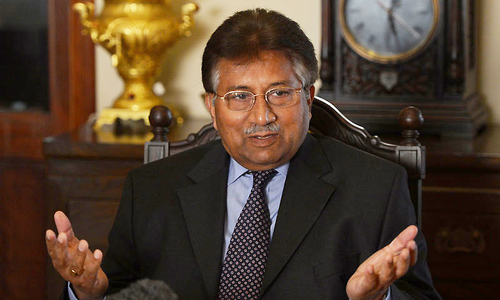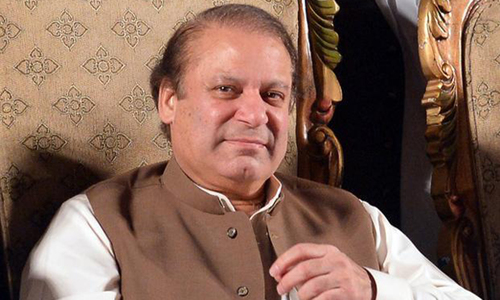
HE can’t help it, can he? He has to put his foot in it every few days. After his abortive attempt to forge an alliance of 23, mostly non-existent, reluctant parties, Musharraf has spoken again without thinking.
Stung by the PPP leader Bilawal Bhutto-Zardari’s slogans dubbing him a murderer , the former military leader responded by attacking BBZ for “aurton ki tarah naaray lagwa raha thaa [raising slogans like women]” and dared him to behave like a “mard [man]”. BBZ was addressing a gathering of charged party supporters on the 10th anniversary commemoration of his mother’s assassination and was visibly emotional and provocative. That though was enough to get the former military ruler going.
Musharraf is a bitter man whose desire for spending his retirement at his grand estate in Islamabad’s ultra-green suburb of Chak Shahzad, playing bridge with his friends and pursuing other activities close to his heart, was thwarted by the treason case against him.
Having remained at the centre of attention for his nearly nine years’ tenure, strolling with US presidents through the White House Rose Garden and Camp David’s green expanses among other grand state occasions elsewhere, he is now confined to the narrow balcony of his Dubai apartment with only occasional forays into the dance floor be it at weddings or discotheques.
So, he does not shy away from stirring controversies. Perhaps, he feels this gives him relevance as, one can be sure, like many expats who have retired but retain an interest in Pakistani politics, a major part of his day is spent in front of the idiot box watching farcical talk shows from home.
The former dictator does not shy away from stirring controversies.
It does not need an Einstein to figure out that regardless of the context, when his statements trigger dozens of mentions on TV news channels, his ego inflates and his commando chest expands.
His latest statement has drawn the wrath of all decent people in sync with this century’s norms and demands and he has been slammed for his dives into misogyny every so often for he can create waves without demeaning himself like that if that is what he wants to do.
The appetite of the TV news channels and of the many a dunce (honourable exceptions notwithstanding) in charge of filling hour after hour of air time with heavily made-up faces and ill-fitting suits is such that any word out of the former dictator’s mouth will be lapped up with pleasure.
Musharraf does not have to show disdain for women to make TV news. But he does. Who can forget even during his heyday he made that odious statement about Pakistani women wanting to get raped in order to obtain a foreign passport?
Now his desperation knows no bounds. His defenders mention his decision to greatly enhance women’s representation in parliament to discount that he is a misogynist. But then us ‘bloody civilians’ will hardly ever know what makes military rulers tick. He got what he had coming after his latest display of misogyny. But another equally damning statement somehow did not get the sort of attention it warranted as he conceded to the BBC that “rogue elements” of the military establishment could have been involved in Benazir Bhutto’s murder.
This admission was explosive coming from a man who was head of state when the former prime minister was assassinated. Having said adieu to his uniform a decade back, Musharraf never tires of claiming that any criticism directed towards him is actually aimed at the army.
Therefore, it is a paradox that one of the most abrasively aggressive DGs ISPR (who is currently in office) fails to take any questions related to Musharraf’s remarks no matter how outlandish those are, inevitably redirecting the questioners to the former general himself.
Is it reverence for the former chief or in reality Musharraf’s utter irrelevance in the scene today as well as the emerging scenario that the army declines to comment on his verbal indiscretions? Whatever the case, no such quarter is given to members of the elected government.
Every statement deemed as even a shade short of a length is hooked like it were a bouncer. Not just that. Where everyone else, most notably his own institution, is seen understandably through the softest of lenses, ministers are routinely decried for ‘deliberately’ doing things they shouldn’t be doing.
One can’t tire of saying that once the security establishment is done encouraging all MQM factions to unite under one — preferably with a non-MQM nomenclature — banner in Sindh, after facilitating agreements which seem to grant the upper hand to foul-mouthed extremists in Punjab and the federal capital, and after riding roughshod over peaceful dissidents, it will focus fulltime on its job of defending the motherland.
The executive will have to rise to the occasion and deliver exceptional governance, so other, ever-ready institutions can’t contemplate a saviour role for themselves as many such altruistic interventions have led to not-in-the-least altruistic outcomes in the past. And let’s also not forget that after ensuring that the quality of healthcare and water supplied to the citizens of the major metropolises of Karachi and Lahore is satisfactory, the honourable justices of our superior judiciary will also focus on provision of justice in their own courts and more so in their subordinate judiciary.
The Constitution has laid down specific roles for every institution and also clearly demarcated the area of responsibility of each. As we struggle to learn to walk down the democratic path, we must be mindful that failures and transgressions cannot be sustained over the long term.
The Musharrafs of this world can provide occasional distractions, even comic relief, but the issues confronting the common man are way too many and critical to be left unaddressed. Not many jostling for prime positions in the intense power play we see today seem to realise that they fear each other more than what they should actually fear: the wrath of a people, neglected and let down.
The writer is a former editor of Dawn.
Published in Dawn, December 30th, 2017












































